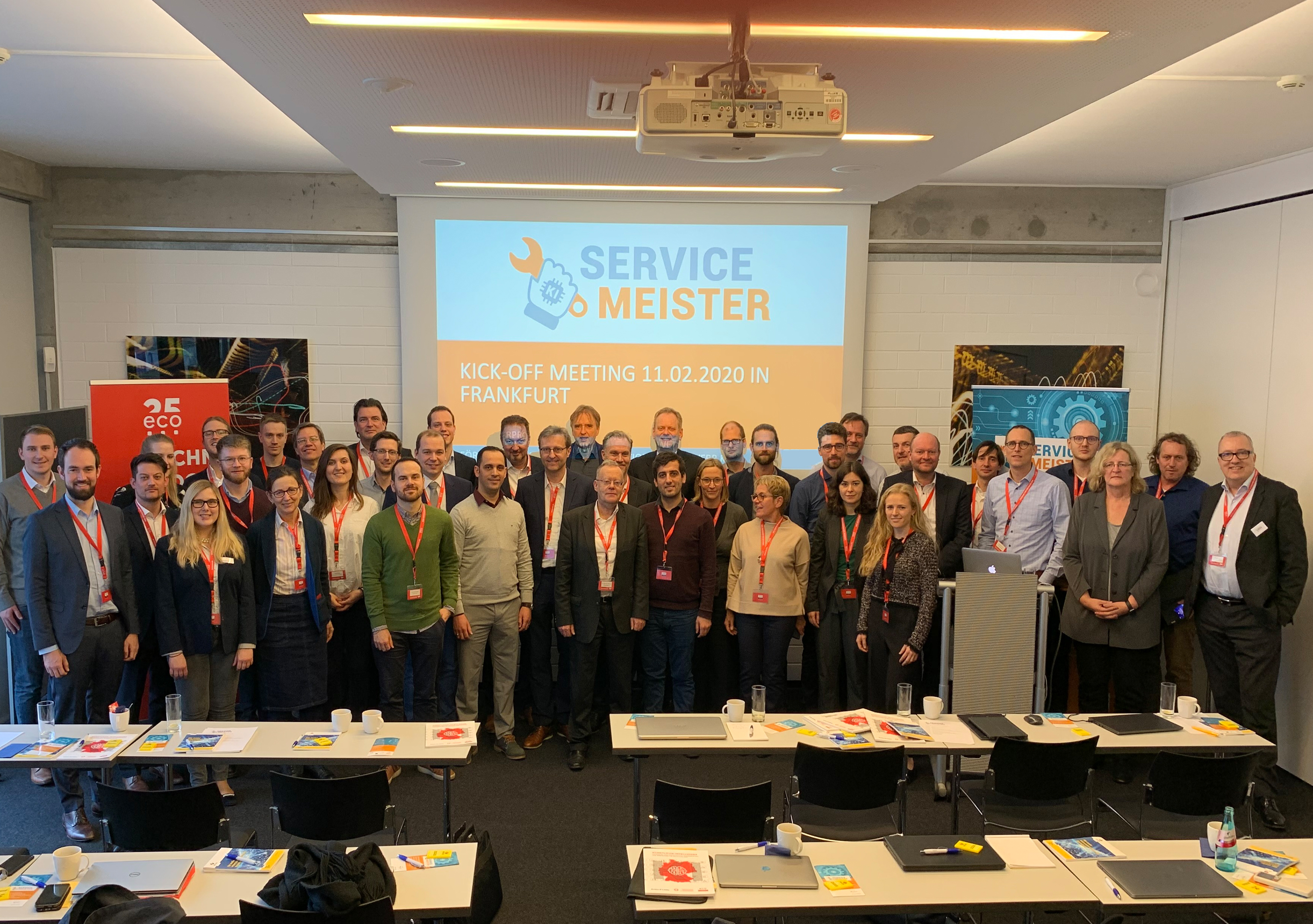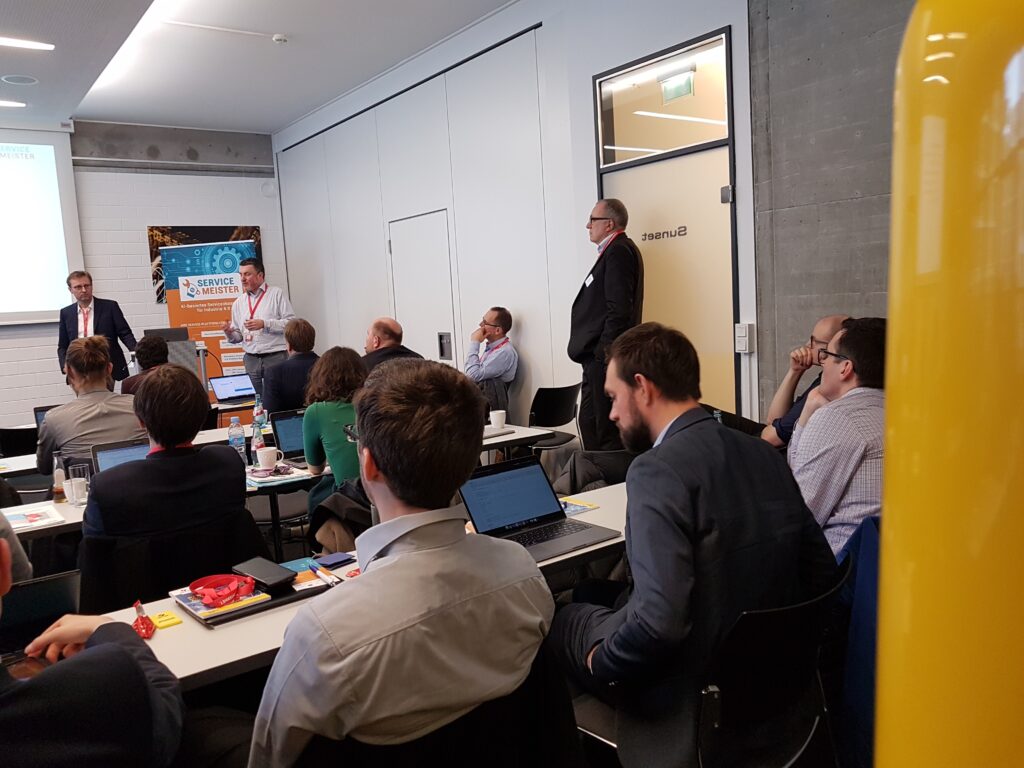
Kick-off event for Service-Meister: On 11 February 2020, the Consortium met in Frankfurt am Main, Germany for the kick-off of the Service-Meister project. The goal: to work together in an optimal way to quickly develop practical AI solutions for SMEs and industry.
Trumpf has its own laser systems on the market for precise sheet metal cutting and flexible welding. “Wherever in the world we have to maintain or repair our high-tech equipment, expert know-how is required,” said Martin Lukas from Trumpf. “Know-how that is not available everywhere in the same quality from the service teams.” What can help: Artificially intelligent (AI) tools, data analysis, and smart algorithms, such as those that the Service-Meister project will develop over the next three years.
Digital tools will support service teams in their work. They should also enable them to carry out complex repairs, such as those that may be necessary for Trumpf laser systems. In order for service knowledge to scale in this way, basic work is necessary. For this purpose, Service-Meister brings together the companies KEB, Atlas Copco, Würth, Krohne, and Trumpf with the implementation partners USU, Inovex, and grandcentrix. The company tandems provide digital support for individual use cases in service in six so-called speedboat projects. What is necessary to make the work a success? “Teamwork, dialogue, discussion – right from the start,” said Hauke Timmermann, who is organizing the project with the consortium leader, the eco Association. “The Consortium also includes numerous associated partners from business and science.” More than 40 participants travelled to the kick-off event alone.

A question of digital sovereignty
How do the requirements from the speedboat projects get into AI research? How can the solutions later be made available to third parties? And how can data be shared in a controlled way and intellectual property be protected? “At Service-Meister, we are concerned with questions of digital sovereignty ,” said Andreas Weiss, head of the Consortium. “We want to develop and disclose procedures for SMEs and thus make them available to all users. For this purpose, we rely on standardized and generic models with defined interfaces and AI.” Why this will pay off in the end is shown by a current study by the eco Association: comprehensive use of AI would release a total potential of 488 billion Euros in Germany by 2025.
Now it is time for the project to get underway and the speedboat projects from Service-Meister are pressing ahead. “In design-thinking workshops, we evaluate the demand in the use cases,” said Dr. Niklas Kühl of KIT. “Right from the start, we have to respond precisely to the requirements of the users in order to produce maximally relevant results later.” After three years of project duration, a flourishing ecosystem should emerge that intelligently maps any service processes from end-to-end and supports them appropriately with AI.
Platform for Europe: Gaining ground with clever transfers
“AI, data and platforms are the key,” said Dr. Alexander Löser from the Beuth University of Applied Sciences in Berlin. But: “Whether Apple, Alphabet or Alibaba – the USA and Asia currently share the world of platforms among themselves. Where is Europe’s opportunity then? “In B2B markets and in engineering,” said Dr. Steffen Staab from the University of Koblenz-Landau. “Here, Service-Meister can score points and gain ground.” With clever transfers, the consortium should be able to achieve this. Löser: “We are transferring AI procedures from medical to industrial services.”
To do so, Löser trained algorithms with physician’s letters to analyze the formally structured and partially standardized reports. This way, for example, chat bots can be implemented that can suggest the appropriate therapy depending on the diagnosis. “The same approach that speeds up the treatment of patients will now also make it easier to repair machines,” said Löser. What was the last thing that needed to be repaired on a specific machine? What tools were required? And how did the technician describe the damage? Löser: “Soon voice assistants in the Service Department will know the answers.”
Solutions for a successful ecosystem
The research being done in parallel ensures that the Service-Meister project will develop solutions from industry for industry. The Institute for Innovation and Technology, IIT for short, is responsible for this. “We act from the sidelines, see ourselves as sparring partners, provide support in the exploitation and business model,” said Dr. Steffen Wischmann of the IIT. Currently, a study is being planned to find out whether the way an AI makes decisions is comprehensible to humans (Explainable Artificial Intelligence). The mechanisms are often not transparent, which can be problematic.
Probleme mit KI? Nicht so bei Service-Meister: „Wir müssen erst zuhören und dann umsetzen“, sagte Weiss. „Und wir müssen unsere Erfolge früh sichtbar machen, damit Service-Meister keine Projektinsel für sich bleibt, sondern zu einem souveränen und attraktiven KI-basierten Ökosystem für alle Serviceprozesse heranwächst.“
Problems with AI? Not so with Service-Meister: “We have to listen first and then implement,” said Weiss. “And we have to make our successes visible early on, so that Service-Meister does not remain an island project, all on its own, but grows into a sovereign and attractive AI-based ecosystem for all service processes.”
Keep up to date with our Service-Meister newsletter on all topics concerning the project and the current events and workshops.
